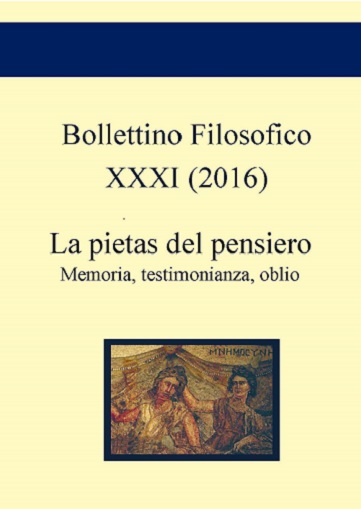Ricostruzione, interpretazione, storicità. Ancora sul rapporto tra psicoanalisi e storia
Abstract
This essay is a reflection on the possibility of hybridization between history and philosophy, but also between history and psychology. When we think about what might be the common areas of historical research and psychological research and, in particular, psychoanalytic research, we usually think of the categories of construction and interpretation, but also those of narration and temporality. The possible link between the "comprising psychology" of Dilthey and Freudian psychoanalysis is the common goal of understanding the human spirit in all its complexity and unity of thought and instinct. This might be called "critical historicism". A critical historicism that just inspired by the principles of psychoanalysis can manifest its fundamental character: the rejection of any vision of history as a relentless process towards perfection and well-being of humanity, as a place of linear and incontrovertible progress accomplishment.
Downloads
Bollettino Filosofico pubblica in internet, ad accesso aperto, con licenza:
|
|
CCPL Creative Commons Attribution |
L'autore conserva il copyright sul suo contributo, consentendo tuttavia a chiunque "di riprodurre, distribuire, comunicare al pubblico, esporre in pubblico, rappresentare, eseguire e recitare l'opera", purché siano correttamente citati l'autore e il titolo della rivista. L’autore, al momento della proposta di pubblicazione, è inoltre tenuto a dichiarare che il contenuto e l’organizzazione dell’opera è originale e non compromette in alcun modo i diritti di terzi, né gli obblighi connessi alla salvaguardia di diritti morali ed economici di altri autori o di altri aventi diritto, sia per testi, immagini, foto, tabelle, sia per altre parti di cui il contributo può essere composto. L’autore dichiara altresì di essere a conoscenza delle sanzioni previste dal codice penale e dalle leggi speciali per l’ipotesi di falsità in atti ed uso di atti falsi, e che pertanto Bollettino Filosofico è esente da qualsiasi responsabilità di qualsivoglia natura, civile, amministrativa o penale, e sarà dall'autore tenuta indenne da qualsiasi richiesta o rivendicazione da parte di terzi.
